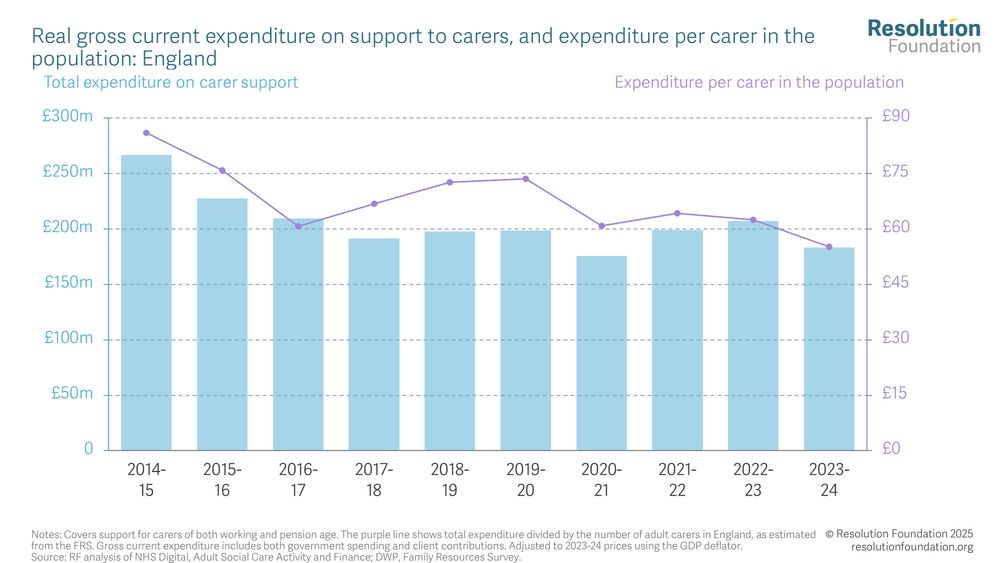#carer #disability #poverty
14.08.2025 07:51 — 👍 0 🔁 0 💬 0 📌 0
Work with us - Gaddum
Job opportunity / casual role:
Peer researcher in Greater Manchester, for people with personal experience of using or navigating health and/or care services e.g. as a carer or family member
Pay: £15/ hr
Deadline 1 Sept 2025.
www.gaddum.org.uk/work-with-us/
06.08.2025 16:01 — 👍 0 🔁 0 💬 0 📌 0
Please fill in if you are an unpaid carer, or share - this is the key annual survey of unpaid carers that helps to amplify carers voices
Deadline 10 Aug
06.08.2025 15:29 — 👍 1 🔁 0 💬 0 📌 0

figure 14 shows that at the same time as there has been substantial unmet demand for
social care – which has pushed the burden onto unpaid carers – spending in England on
services that support unpaid carers, including respite care, has fallen by nearly a third (31
per cent) since 2014-15 (the earliest comparable data), or by 36 per cent per carer in the
population. As a result, fewer carers have accessed such support: between 2012-13 and
2023-24, the proportion of carers that received home care or help for the person they care
for fell from two-fifths (41 per cent) to just under a third (31 per cent), and those accessing
day centres or day activities dropped from nearly a third (31 per cent) to just over onefifth (23 per cent).7
There is substantial unmet demand for social care – which has pushed the burden onto unpaid carers.
At the same time, spending in England on services that support unpaid carers, including respite care, has fallen by nearly a third.
29.07.2025 08:30 — 👍 12 🔁 15 💬 1 📌 0

🆕 Comparing Census data with 13 million GP records, we've analysed how good general practices are at recording who is an unpaid carer in England.
#Carers from deprived areas and certain ethnic groups are much more likely to be missed by general practices.
buff.ly/9WxpUJb
29.07.2025 08:29 — 👍 13 🔁 8 💬 0 📌 1
More than just an information and signposting service for adults with Learning Disabilities, their families and carers in Calderdale. A Cloverleaf Advocacy service.
Delivering digital services in government. Bridging user needs, policy, and tech with a focus on collaboration, agile, and public value. Cursed with the “how hard can it be” gene—always juggling personal projects on shiny new things! 😁
We are the Library Service @thekingsfund.bsky.social. We cover UK health & social care policy and we're happy to answer your enquiries: library@kingsfund.org.uk
Lecturer in Library and Information Management @ University of Sheffield, Information School.
Researching digital inclusion, digital poverty, rural digital connectivity, social inclusion, community space (inc libraries), intermediaries & access to reading
Policy and Practice Manager at Carers Trust. Usually tend to post about carers, politics, social care, education, football or musicals.
Any posts are strictly in a personal capacity.
Carer activist, poet and author of "A Caring Mind". Volunteer at Carers UK and network partner at Carers Trust
Providing compassionate mental health support in the Borough of Rochdale. Dedicated to making a difference in our community.
The Mind Wellbeing Centre, 3-11 Drake Street, OL16 1RE
www.rochdalemind.org.uk
01706 752 338
#MentalHealthCharity #RochdaleMind
Working for a well connected and influential voluntary, community, faith and social enterprise (VCFSE) sector in the North West
🌐 vsnw.org.uk
📧 info@vsnw.org.uk
We do research with people with learning disabilities, autistic people, and their families. We are committed to social justice and more equal research practice.
Join our mailing list for event news: https://forms.office.com/e/SihkWJ4eYE
Updates from #DigitalLifeline project at #ManMetUni in collaboration #ARC, #GoodThingsFoundation, #LearningDisabilityEngland, and #SeeAbility. Funded by #NIHR
Learning Disability England is a movement for change. Our members are people with learning disabilities, families, & organisations. We work for human rights, equality & good lives.
https://www.learningdisabilityengland.org.uk/
Powering the National Databank, National Device Bank and our free online digital skills platform, Learn My Way. Supporting the National Digital Inclusion Network.
Header image text reads: "Fixing the digital divide - for good."
Reader (Associate Prof) in intellectual disabilities, Dept Social Care & Social Work, Manchester Met Uni. Researching social & health inequalities, digital inclusion, qual, creative, participatory research methods
National nonprofit led by people with lived experience helping families navigate pediatric Long COVID with support, resources, and advocacy.
We (The World Health Organization) are the United Nations’ health agency championing Health For All. Always check the latest posts for updated advice/information. We will remove misinformation, spam, and hate speech here.
People with #LearningDisabilities #Autism #PeterAndFriends #ChooseLDNursing #LetsTalkAboutSexuality #SelfAdvocacyWorks
Trustee at @dvcdudley.bsky.social
Data Scientist, Award Winning Teacher, Maker, PhD Researcher 📚 #Tes #Edtech50 #Bima100 #Judge #Crafting edu/tech narrative.
•Hon University Fellow- Fac Health
•Founder The Oliver McGowan Mandatory Training
•Patient Safety
•Hoping for a Social Media Platform where everyone can live together peacefully
#Oliverscampaign
Brought to you by Oldham Council - providing the latest service news and information!
We are here for you with advice you can trust, when you really need it. We are campaigning on the issues that affect every single one of us.
We are helping to build a fairer society.
citizensadvicegm.org.uk/citizensadvicesort

